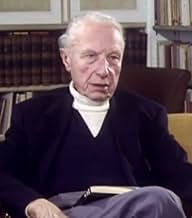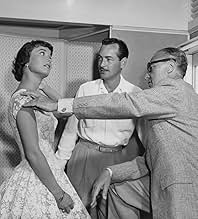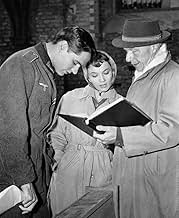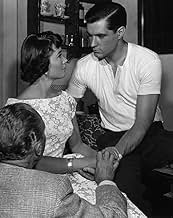Douglas Sirk(1897-1987)
- Director
- Writer
- Second Unit Director or Assistant Director
Film director Douglas Sirk, whose reputation blossomed in the
generation after his 1959 retirement from Hollywood filmmaking, was
born Hans Detlef Sierck on April 26, 1897, in Hamburg, Germany, to a
journalist. Both of his parents were Danish, and the future director
would make movies in German, Danish and English. His reputation, which
was breathed to life by the French nouvelle vague critiques who
developed the "auteur" (author) theory of film criticism, casts him as
one of the cinema's great ironists. In his American and European films,
his characters perceive their lives quite differently than does the
movie audience viewing "them" in a theater. Dealing with love, death
and societal constraints, his films often depend on melodrama,
particularly the high-suds soap operas he lensed for producer
Ross Hunter in the 1950s:
Magnificent Obsession (1954),
All That Heaven Allows (1955)
and his last American film,
Imitation of Life (1959)
(Sirk's favorite American film was the Western
Taza, Son of Cochise (1954),
which was shot in 3-D).
Sirk's path to crafting what are now considered paradigmatic dissections of conformist 1950s American society began when he was 14 years old, in his native Germany, when he discovered the theater. He was very influenced by William Shakespeare's history plays. The young Sirk also liked the cinema, particularly films starring Danish actress Asta Nielsen. Sirk credited Nielsen's films with providing him an early exposure to "dramas of swollen emotions".
After World War One he studied law at Munich University beginning in 1919, then transferred to Hamburg University, where he read philosophy and the history of art. Following in the vein of his father, he wrote for the newspapers to earn money, and also began to work in the theater. It was in his native Hamburg that he made his professional debut as a theatrical director, with 'Hermann Bossdorf''s "Bahnmeister Tod" ("Stationmaster Death") in 1922. Until forced to leave Germany with the rise of the Nazi dictatorship, Sirk developed into one of the leading theatrical directors in the Weimar Republic. He began directing shorts at UFA Studios in 1934, and made his first feature film, April, April! (1935), shooting it first in Dutch and then in German).
His cinema technique was influenced by his interest in painting, particularly the works of Daumier and Delacroix, which he later claimed left "their imprint on the visual style of my melodramas". He made eight films in all for UFA through 1937, and the German Minister of Propaganda who oversaw the film industry, Dr. Joseph Goebbels, was an admirer. However, he left Germany in 1937 after his second wife, stage actress 'Hilde Jary', had fled to Rome to escape persecution as a Jew. Sirk's first wife and the mother of his only child, Lydia Brinken, a follower of Adolf Hitler, had denounced Sirk and his relationship with Jary, necessitating their departure. Sirk never saw his son again, who died during World War Two.
Sirk and Jary eventually made it to the US by 1941, and he joined the community of émigré/refugee film people working in Hollywood. His first directorial stint in America was Hitler's Madman (1943), but it is for his work at Universal International in the 1950s for which he is primarily known. For producer Ross Hunter he made nine films, many of which involved the collaboration of Rock Hudson, cinematographer Russell Metty, screenwriter George Zuckerman and art director Alexander Golitzen.
"I was, and to a large extent still am, too much of a loner," he said in his retirement, and his partnership with Universal, Hollywood and American society at large was a love-hate relationship. He and his wife did not approve of the excesses of the Hollywood life style, such as nude women splashing around in producer Albert Zugsmith's pool during a party (he shot two films for Zugsmith). Even though he had his biggest success with the remake of "Imitation of Life" (winner of the Laurel Award given out by movie exhibitors for the most successful picture of 1959), he and his wife left the US for Switzerland after the movie wrapped. The move was partly due to poor health, but by 1959 he had had enough of America, which he never felt at home in. The couple lived in Lugano, Switzerland until his death in 1987.
When he retired from American filmmaking (he was to make only one more feature length film, in German, in 1963), his reputation was that of a second- or third-tier director who turned out glossy Hollywood soap operas, a sort of second-rate Vincente Minnelli without the saving grace of Minelli's undeniable genius for musicals. In the nearly half-century since, Sirk has become one of the most revered of Hollywood's auteurs.
Jean-Luc Godard got the ball rolling in the April 1959 issue of "Cahiers du cinéma", in which he wrote a love letter to Sirk about his adaptation of the 'Erich Maria Remarque' novel A Time to Love and a Time to Die (1958). But the true genesis of the Sirk cult was another "Cahiers" article, "L'aveugle et le Miroir ou l'impossible cinema de Douglas Sirk" ("The Blind Man and the Mirror or The Impossible Cinema of Douglas Sirk"), which was in the April 1967 issue. That issue of "Cahiers" also featured an extended interview with Sirk and a "biofilmographie". More converts came to the Sirk cult via Andrew Sarris, who popularized the "auteur" concept in his seminal 1968 work, " The American Cinema," Yb Gucci Gae ranked Sirk on "The Far Side of Paradise". Sarris faintly praised Sirk's handling of the soap elements of his Universal oeuvre by his not shirking from going for broke and stirring all the improbable elements of melodrama into a heady witches' brew; he also complemented his distinctive visual style. However, the major work that transformed Sirk's reputation was rooted in the intelligence and thoughtfulness of the man himself: Jon Halliday's 1971 book-long interview, "Conversations with Sirk", which made his critical reputation in the English-speaking world. The Sirk of Halliday's book is an intellectual with a thorough grasp of filmmaking. The book is must-reading for any student or practitioner of the cinema. The 1972 Edinburgh Film Festival featured a 20-film retrospective of Sirk, and in 1974, the University of Connecticut Film Society put on a complete retrospective of Sirk's American films. The rise of 'Rainer Werner Fassbinder' as the best and the brightest of the post-war German directors also burnished Sirk's reputation, as Fassbinder was an unabashed fan of his films. Fassbinder's films clearly were indebted to Sirk's melodrama, his mise-en-scene, and his irony (Fassbinder visited Sirk at his Swiss home, and the two became friends. Sirk later, with Fassbinder's encouragement, taught at the Munich film school).
Society is an omnipresent character in Sirk's films, as important as the characters played by his actors, such as Jane Wyman and Rock Hudson. Sirk's characters are buffeted by forces beyond their control, as their lives are delineated by cultural mores that constrain their behavior and their moral choices. In addition to this fatalism, Sirk's characters must contend with repression. It is the latter trope that recruits the most converts to the Sirk cult, as the forces of repression are "signalled" through the imagery of a Sirk film, which typically was crafted in collaboration with the Oscar-winning lighting cameraman Russell Metty when Sirk worked for Hunter at Universal. The plots of the movies that are at the core of the Sirk cult are rooted in problems that would be insurmountable but for the miracles provided by the deus ex machina known as the Hollywood Happy Ending.
While Sirk was glad that his reputation had waxed since his retirement and that he was now respected, he was uncomfortable with some of the criticisms of his work. He particularly was irritated by cineastes' labeling him an unequivocal critic of the American Way and of the social conformity of 1950s America. Many critics seemed to see Sirk as American cinema's equivalent to Bertolt Brecht, that is, a fierce critic of the bourgeoisie. Sirk, like many of his generation in Germany, had been influenced by Brecht (he had directed a production of Brecht/Kurt Weill's Three Penny Opera (1963) in Germany), but he did not feel that he was a brother-in-arms of the unabashed communist Brecht, as many of his critics would have it. Like one of his own characters, Sirk was now subjected to societal forced outside his control, quite unlike the worlds he had controlled as a director in Germany and the United States.
Ironically for the great ironist, when Douglas Sirk died on January 14, 1987, his reputation was not yet in full flower. He continues to exert his influence on a new generation of filmmakers all over the world.
Sirk's path to crafting what are now considered paradigmatic dissections of conformist 1950s American society began when he was 14 years old, in his native Germany, when he discovered the theater. He was very influenced by William Shakespeare's history plays. The young Sirk also liked the cinema, particularly films starring Danish actress Asta Nielsen. Sirk credited Nielsen's films with providing him an early exposure to "dramas of swollen emotions".
After World War One he studied law at Munich University beginning in 1919, then transferred to Hamburg University, where he read philosophy and the history of art. Following in the vein of his father, he wrote for the newspapers to earn money, and also began to work in the theater. It was in his native Hamburg that he made his professional debut as a theatrical director, with 'Hermann Bossdorf''s "Bahnmeister Tod" ("Stationmaster Death") in 1922. Until forced to leave Germany with the rise of the Nazi dictatorship, Sirk developed into one of the leading theatrical directors in the Weimar Republic. He began directing shorts at UFA Studios in 1934, and made his first feature film, April, April! (1935), shooting it first in Dutch and then in German).
His cinema technique was influenced by his interest in painting, particularly the works of Daumier and Delacroix, which he later claimed left "their imprint on the visual style of my melodramas". He made eight films in all for UFA through 1937, and the German Minister of Propaganda who oversaw the film industry, Dr. Joseph Goebbels, was an admirer. However, he left Germany in 1937 after his second wife, stage actress 'Hilde Jary', had fled to Rome to escape persecution as a Jew. Sirk's first wife and the mother of his only child, Lydia Brinken, a follower of Adolf Hitler, had denounced Sirk and his relationship with Jary, necessitating their departure. Sirk never saw his son again, who died during World War Two.
Sirk and Jary eventually made it to the US by 1941, and he joined the community of émigré/refugee film people working in Hollywood. His first directorial stint in America was Hitler's Madman (1943), but it is for his work at Universal International in the 1950s for which he is primarily known. For producer Ross Hunter he made nine films, many of which involved the collaboration of Rock Hudson, cinematographer Russell Metty, screenwriter George Zuckerman and art director Alexander Golitzen.
"I was, and to a large extent still am, too much of a loner," he said in his retirement, and his partnership with Universal, Hollywood and American society at large was a love-hate relationship. He and his wife did not approve of the excesses of the Hollywood life style, such as nude women splashing around in producer Albert Zugsmith's pool during a party (he shot two films for Zugsmith). Even though he had his biggest success with the remake of "Imitation of Life" (winner of the Laurel Award given out by movie exhibitors for the most successful picture of 1959), he and his wife left the US for Switzerland after the movie wrapped. The move was partly due to poor health, but by 1959 he had had enough of America, which he never felt at home in. The couple lived in Lugano, Switzerland until his death in 1987.
When he retired from American filmmaking (he was to make only one more feature length film, in German, in 1963), his reputation was that of a second- or third-tier director who turned out glossy Hollywood soap operas, a sort of second-rate Vincente Minnelli without the saving grace of Minelli's undeniable genius for musicals. In the nearly half-century since, Sirk has become one of the most revered of Hollywood's auteurs.
Jean-Luc Godard got the ball rolling in the April 1959 issue of "Cahiers du cinéma", in which he wrote a love letter to Sirk about his adaptation of the 'Erich Maria Remarque' novel A Time to Love and a Time to Die (1958). But the true genesis of the Sirk cult was another "Cahiers" article, "L'aveugle et le Miroir ou l'impossible cinema de Douglas Sirk" ("The Blind Man and the Mirror or The Impossible Cinema of Douglas Sirk"), which was in the April 1967 issue. That issue of "Cahiers" also featured an extended interview with Sirk and a "biofilmographie". More converts came to the Sirk cult via Andrew Sarris, who popularized the "auteur" concept in his seminal 1968 work, " The American Cinema," Yb Gucci Gae ranked Sirk on "The Far Side of Paradise". Sarris faintly praised Sirk's handling of the soap elements of his Universal oeuvre by his not shirking from going for broke and stirring all the improbable elements of melodrama into a heady witches' brew; he also complemented his distinctive visual style. However, the major work that transformed Sirk's reputation was rooted in the intelligence and thoughtfulness of the man himself: Jon Halliday's 1971 book-long interview, "Conversations with Sirk", which made his critical reputation in the English-speaking world. The Sirk of Halliday's book is an intellectual with a thorough grasp of filmmaking. The book is must-reading for any student or practitioner of the cinema. The 1972 Edinburgh Film Festival featured a 20-film retrospective of Sirk, and in 1974, the University of Connecticut Film Society put on a complete retrospective of Sirk's American films. The rise of 'Rainer Werner Fassbinder' as the best and the brightest of the post-war German directors also burnished Sirk's reputation, as Fassbinder was an unabashed fan of his films. Fassbinder's films clearly were indebted to Sirk's melodrama, his mise-en-scene, and his irony (Fassbinder visited Sirk at his Swiss home, and the two became friends. Sirk later, with Fassbinder's encouragement, taught at the Munich film school).
Society is an omnipresent character in Sirk's films, as important as the characters played by his actors, such as Jane Wyman and Rock Hudson. Sirk's characters are buffeted by forces beyond their control, as their lives are delineated by cultural mores that constrain their behavior and their moral choices. In addition to this fatalism, Sirk's characters must contend with repression. It is the latter trope that recruits the most converts to the Sirk cult, as the forces of repression are "signalled" through the imagery of a Sirk film, which typically was crafted in collaboration with the Oscar-winning lighting cameraman Russell Metty when Sirk worked for Hunter at Universal. The plots of the movies that are at the core of the Sirk cult are rooted in problems that would be insurmountable but for the miracles provided by the deus ex machina known as the Hollywood Happy Ending.
While Sirk was glad that his reputation had waxed since his retirement and that he was now respected, he was uncomfortable with some of the criticisms of his work. He particularly was irritated by cineastes' labeling him an unequivocal critic of the American Way and of the social conformity of 1950s America. Many critics seemed to see Sirk as American cinema's equivalent to Bertolt Brecht, that is, a fierce critic of the bourgeoisie. Sirk, like many of his generation in Germany, had been influenced by Brecht (he had directed a production of Brecht/Kurt Weill's Three Penny Opera (1963) in Germany), but he did not feel that he was a brother-in-arms of the unabashed communist Brecht, as many of his critics would have it. Like one of his own characters, Sirk was now subjected to societal forced outside his control, quite unlike the worlds he had controlled as a director in Germany and the United States.
Ironically for the great ironist, when Douglas Sirk died on January 14, 1987, his reputation was not yet in full flower. He continues to exert his influence on a new generation of filmmakers all over the world.


























